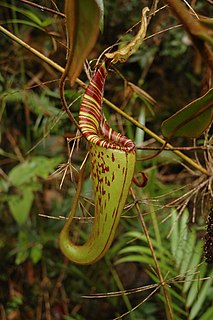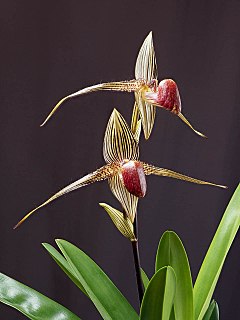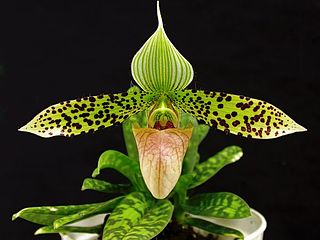
The Orchidaceae are a diverse and widespread family of flowering plants, with blooms that are often colourful and fragrant, commonly known as the orchid family.

Paphiopedilum, often called the Venus slipper, is a genus of the lady slipper orchid subfamily Cypripedioideae of the flowering plant family Orchidaceae. The genus comprises some 80 accepted taxa including several natural hybrids. The genus is native to Southeast Asia, the Indian Subcontinent, southern China, New Guinea and the Solomon and Bismarck Islands.

Phragmipedium is a genus of the Orchid family (Orchidaceae) and the only genus comprised in the tribe Phragmipedieae and subtribe Phragmipediinae. The name of the genus is derived from the Greek phragma, which means "division", and pedium, which means "slipper". It is abbreviated 'Phrag' in trade journals.

Cephalanthera rubra, known as red helleborine, is an orchid found in Europe, North Africa and southwest Asia. Although reasonably common in parts of its range, this Cephalanthera has always been one of the rarest orchids in Britain.

Nepenthes hurrelliana is a tropical pitcher plant endemic to Borneo, where it has been recorded from northern Sarawak, southwestern Sabah, and Brunei. It is of putative hybrid origin; its two original parent species are thought to be N. fusca and N. veitchii. A thick indumentum of rusty-brown hairs covers the entire plant, a characteristic presumably inherited from the latter.

Nepenthes campanulata, the bell-shaped pitcher-plant, is a tropical pitcher plant native to Borneo. It has also been reported from Palawan, the Philippines, though further field work is needed to confirm this identification.

Nepenthes faizaliana is a tropical pitcher plant endemic to the limestone cliffs of Gunung Mulu National Park in Sarawak, Borneo. It is thought to be most closely related to N. boschiana.

Nepenthes muluensis, or the Mulu pitcher-plant, is a tropical pitcher plant endemic to Borneo. It grows in highland habitats at elevations of 1700 to 2400 m above sea level.

Paphiopedilum armeniacum is a species of flowering plant in the orchid family, Orchidaceae. It is known commonly as the apricot orange paphiopedilum and golden slipper orchid. It is endemic to China, where it occurs only in Yunnan. It is also cultivated and has won prestigious awards at flower shows.

Paphiopedilum rothschildianum, it is commonly known as the Gold of Kinabalu orchid or Rothschild's slipper orchid, is a large sized clear-leafed species of orchid. It blooms with a tall inflorescence with up to six, large flowers. It is unique in the Corypetalum group by holding its petals almost horizontally, giving the flower a very distinctive appearance. The peak flowering period is from April to May.

Paphiopedilum barbigerum is a species of flowering plant in the family Orchidaceae known commonly as the beard carrying paphiopedilum. It is native to China, Vietnam, and Thailand. It is an endangered species due to habitat destruction and overcollection for the horticultural trade.

Paphiopedilum dianthum is a species of flowering plant in the orchid family, Orchidaceae. It is native to China, Laos, and Vietnam. It is known commonly as the double flowered paphiopedilum.

Paphiopedilum fowliei is a species of plant in the family Orchidaceae. It is endemic to Palawan in the Philippines. Its natural habitat is subtropical or tropical moist lowland forests. It is threatened by habitat loss.

Dendrobium kingianum, commonly known as the pink rock orchid, is a flowering plant in the orchid family Orchidaceae and is endemic to eastern Australia. It usually grows on rocks, rarely as an epiphyte, and has thin, spreading leaves and spikes of up to fifteen, usually pink flowers in late winter to spring. It is popular in Australian native horticulture and is a commonly cultivated orchid among Australian orchid species growers.

Coelogyne flaccida is a species of orchid that is native to southeast Asia and northeastern South Asia. Cultivated as an ornamental plant, it is also known as the bearded Coelogyne and the loose Coelogyne.

Paphiopedilum sukhakulii is a species of plant in the family Orchidaceae.

Phalaenopsis gigantea is named for the giant size of its leaves, which can grown over 2 feet in length on a mature plant. This orchid is endemic to Borneo and was first described in 1909. It is the largest known Phalaenopsis species.
Caladenia audasii is a plant in the orchid family Orchidaceae and is endemic to Victoria. It is a rare ground orchid with a single hairy leaf and a single yellow flower.
Caladenia colorata, commonly known as coloured spider-orchid, small western spider-orchid and painted spider-orchid is a plant in the orchid family Orchidaceae and is endemic to South Australia and possibly Victoria. It is a ground orchid with a single hairy leaf, and usually a single creamy-green flower with blood-red or purple-brown markings and with dark tips on the petals and sepals.
Holopogon pekinensis is a kind of saprotrophic nutrition orchid. In 2017 it was found in Beijing. It grows under a wooded forest in a ravine at an altitude of 1000m in a mountainous area.

















